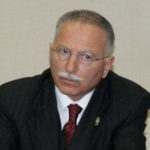By Dr. Rachel Ehrenfeld and Alyssa A. Lappen
Human Events | Posted: 06/27/2007
The Transparency International 2007 global report released on May 24 documents widespread Russian corruption and lack of independence in Russia’s legal system, and its courts in particular. This, according to the report, is due to the government’s growing political interference. Novaya Gazeta, Russia’s best-known opposition newspaper, claims that corruption in Russia is the rule, and “business is impossible without it.”
Moreover, Russian Minister of Economic Development and Trade German Gref, speaking at an investor conference in Moscow last week, admitted that “everyone knows the Taxation Service is corrupt.” Leading investigative reporter Roman Shleinov claimed recently in London, that attempts to expose this corruption resulted in more than 2,000 dead journalists in the last decade.
Russia’s economic growth — more than $515 billion in foreign currency and gold reserves — make Putin very popular among his people, despite the corruption and his regime’s growing restrictions on civil and human rights, freedom of the press, and private, public and foreign entities. Most recently, his popularity reached over 70% approval ratings. Not surprisingly, Putin disregards whatever domestic and foreign criticism of his centralized and authoritarian government. He even declared: “I am an absolute, pure democrat— I am the only one, there just aren’t any others in the world.”
Russia’s long tradition of autocratic regimes seems to empower Putin’s undermining of Russia’s recent history of democratic capitalism. With ever-increasing frequency, Russia uses its corrupt courts to legitimize nationalizing and confiscating private and public corporations from entrepreneurs who built their wealth and the Russian economy on the ashes of the crumbling Soviet infrastructure. Those allowed are holding onto their corporations and vast personal wealth, carrying out Putin’s agenda of centralization and consolidation of domestic and even global strategic resources and industries such as aluminum and steel, and above all, energy.
Putin began consolidating Russia’s energy industry four years ago, with the now familiar ploy of accusing oil company Yukos, and its owner Mikhail Khodorkovsky with tax fraud. Russia’s biggest, state-owned gas and oil company, Gazprom, and its state-owned oil company, Rosneft, grabbed the bankrupted Yukos assets, and Khodorkovsky was sent to prison for nine years. Since then, Yukos’ foreign shareholders are engaged in costly lawsuits outside Russia in attempts to recover damages.
In September 2006, alleging environmental violations, the Russian government revoked the Royal Dutch Shell company license to operate the world’s biggest liquefied gas development in Sakhalin. Less than three months later, Shell was forced to hand over control of the $22 billion project to Gazprom.
The latest casualty is the international oil company BP. The Russian government threats to revoke its development license, culminated when Putin publicly stated: “how much longer do we have to tolerate this?” On June 22, BP was forced to sell its 62.9% stake in the world’s largest natural oil field in Kovykta — worth an estimated $20 billion — to Gazprom for only pennies on the dollar, a mere $700- $900 million.
So it’s no surprise that Canadian investors in Magna International, an auto parts manufacturer and supplier, look askance at plans to sell 20 million shares and partial control for $1.54 billion, in exchange for entry into Russia’s market. The proposed buyer, Russian Machines, is a manufacturing giant controlled by Vladimir Putin’s billionaire crony, “Aluminum King” Oleg Deripaska, whose entry visa to the U.S. was recently revoked.
Deripaska, rumored as Russia’s wealthiest oligarch, would get only 42% of Newco, the new holding company that would control Magna, rather than the 94% that those shares represent. Moreover, according to the agreement, the Canadian owners and executives of the company would receive the equivalent of $883 per share, — though their shares are worth some $93. That doesn’t compute. “When smart, rational people do things like that, and nobody can tell me why — I start getting suspicious,” said one Magna shareholder.
Considering Deripaska’s close personal ties to Putin, Magna shareholder skepticism rose on hearing an assurance from the Canadian company chariman, Frank Stronac, that Putin “endorsed” Deripaska as a business partner. Why is that important, they rightly wonder? Rather than giving Magna entry into Russi’s market, it indicates that Deripaska’s foothold in the company would lead to yet another Russian takeover, and a total loss for Magna’s existing Canadian shareholders.
That would fit Deripaska’s reputed practices, which are often disputed. In May 2007, Deripaska settled a $500 million lawsuit in which his former partners in Tajik Aluminum Smelter TadAZ charged him with fraud and sought an estimated $220 million, plus costs, interest, and damages. Another former business partner, Michael Cherney, is now suing Deripaska for violations of an agreement granting Cherney 20% of RusAl. Initially, Deripaska denied the agreement. the document surfaced, Deripaska has been attempting to evade the British lawsuit by claiming lack of jurisdiction. Unless he settles this dispute, too, his plan to take RusAl public for $30 billion in London later this year may be affected.
All this leaves one questioning the wisdom of U.S. officials, who are now inviting further Russian investment in and joint venture with U.S. businesses. On June 18, U.S. Deputy Treasury secretary Robert Kimmitt declared: “We want to be sure they consider investment opportunities in the United States.”
But smart buyers, bankers and regulators will worry about the provenance of assets offered in Russian IPOs — and how long it will take before Russia “legally” confiscates and fully controls those assets.
All Articles, Poems & Commentaries Copyright © 1971-2021 Alyssa A. Lappen
All Rights Reserved.
Printing is allowed for personal use only | Commercial usage (For Profit) is a copyright violation and written permission must be granted first.






